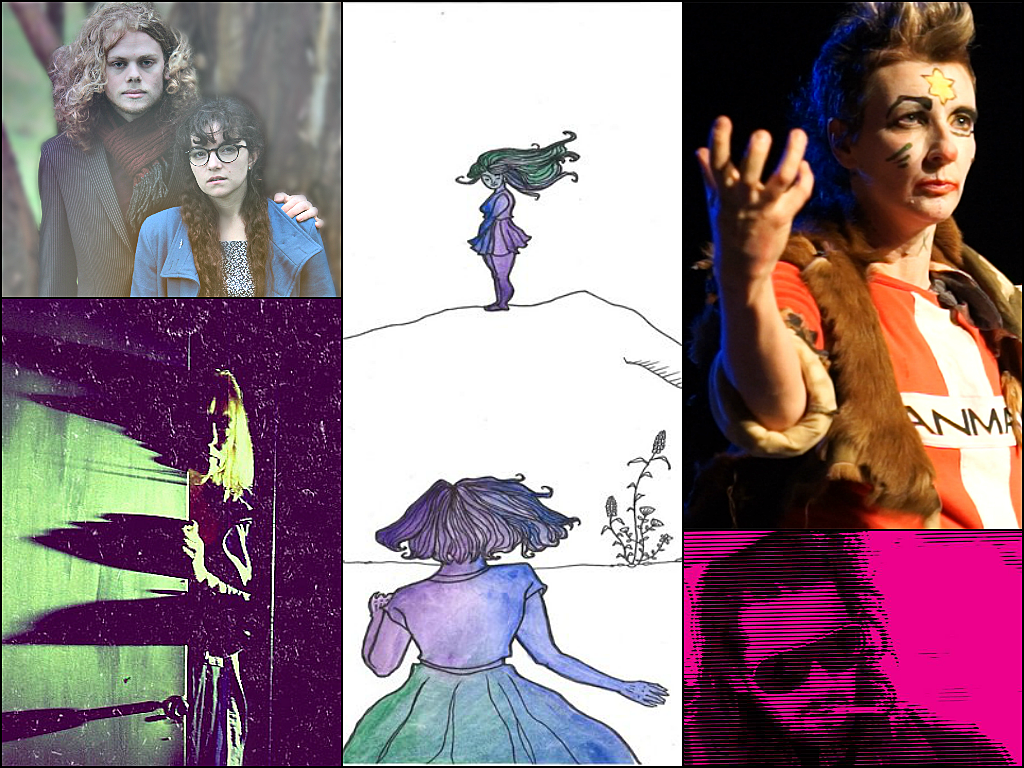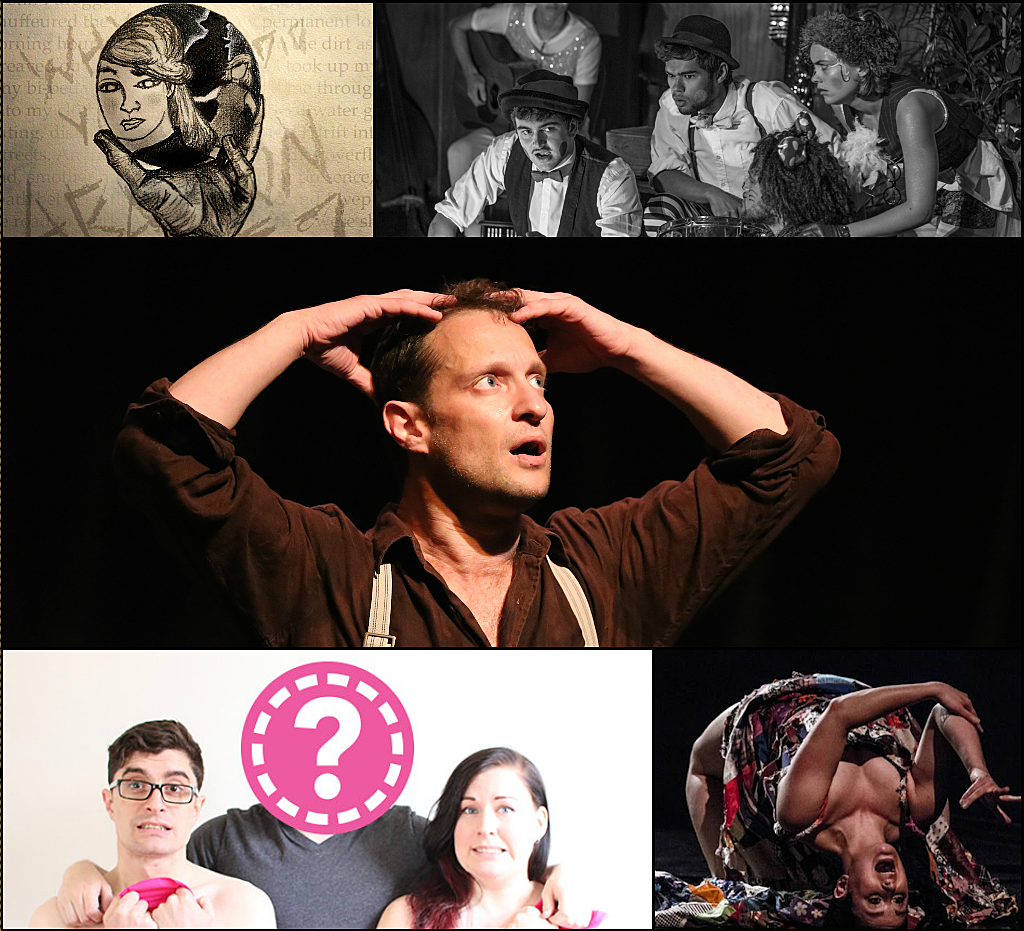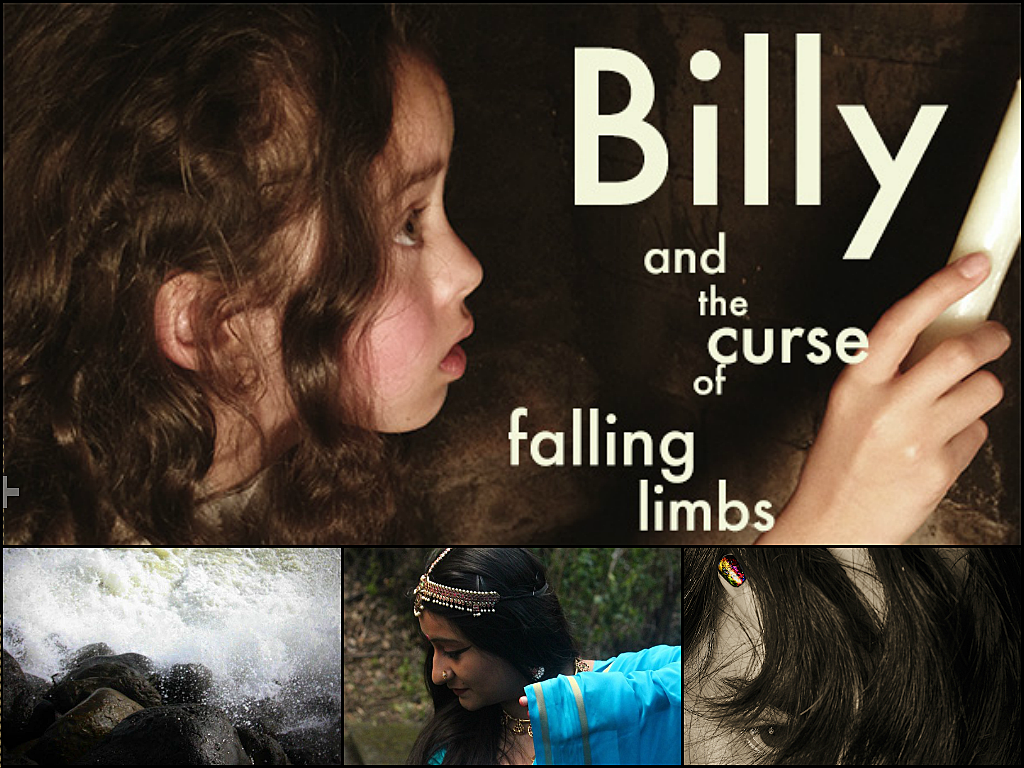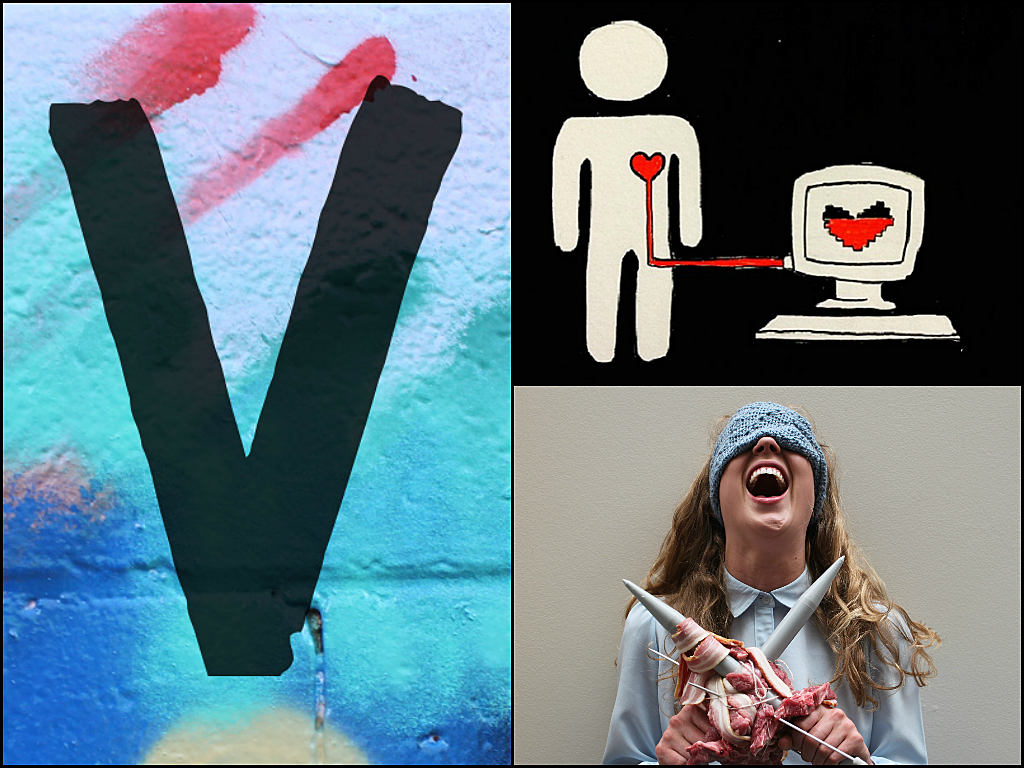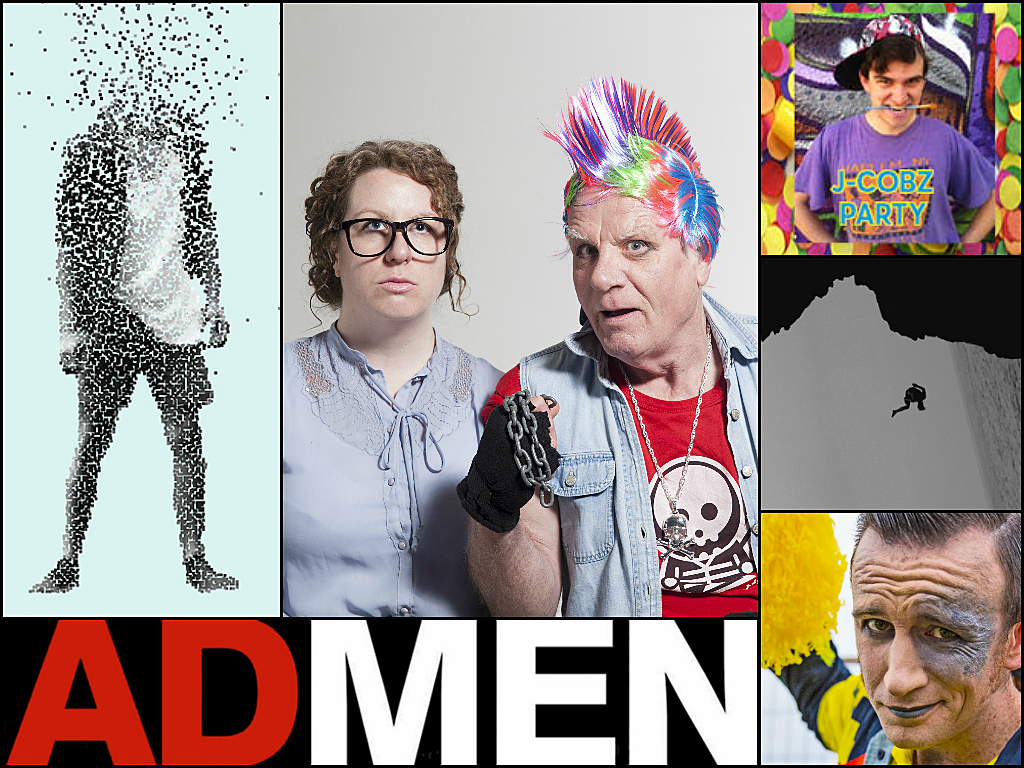Checking the Pulse of the New Zealand Fringe Festival
Six Wellington theatre-makers take stock of the New Zealand Fringe Festival: what's great, what could be better, and why we do it in the first place.
Six Wellington theatre-makers take stock of the New Zealand Fringe Festival: what's great, what could be better, and why we do it in the first place.
Last fortnight, seven Wellington theatre-makers, all of whom have been involved in the New Zealand Fringe Festival in some way in the last few years, wrote about twenty-one shows that excited, interested and provoked them during this year's Fringe. Six of those theatre-makers (Adam Goodall, Baz Macdonald, Hannah Banks, Hilary Penwarden, Matt Loveranes and Ryan Knighton) take a step back and take stock of the New Zealand Fringe Festival - and wrestle with some complicated thoughts about where it stands as a community, as a celebration, and as a site for creation and connection.
“I HAD SEEN SIX SHOWS BEFORE I SAW A MAN ON STAGE THIS FRINGE.”
Hannah Banks
I had seen six shows before I saw a man on stage this Fringe, which is mental. And it wasn’t through deliberate choice, it was just kind of coincidental. Out of a total of eighteen shows I saw six ensembles of women (an ensemble being a loose term for duos or threes or whatever); eight solos by women; two solos by men; one male ensemble; and one mixed ensemble. I thought that that was kind of insane. I’ve never seen that before - there were so many women making theatre in the Fringe and, for the most part, they were really good. I was really impressed by the number of ladies. Baz, what did you call it? Lady-tastic? It was a lady-tastic Fringe.
I thought pointing it out was important because it was a really positive trend, so many awesome women doing solo shows about things which were important to them. Jagged Little Pilgrimage is just a woman [Ali Jacs] who's in love with that album [Alanis Morrisette’s ‘Jagged Little Pill’] saying “Yes, this has affected my life, I’m going to make a show about it”.
Baz Macdonald
What do you think it’s born out of? Is it reactionary? Or just a coincidence?
Hannah
I don’t know. I think it’s a coincidence that I saw them all.
Baz
I saw a lot of women too. We saw different sets of shows and, as a cross-section, I would say it was a definite trend. Did you all notice it as well?
Matt Loveranes
Yeah. Now that Hannah talks about it, my first few shows only had women in them. Also, how many women were in power roles behind the scenes, writing and directing? I’m willing to wager a good amount of them as well.
Adam Goodall
I’m looking at the shows that I saw and a good chunk of them are either one-woman shows, starring women, written by women or women ensembles. It’s fantastic, the sheer volume of it.
Hilary Penwarden
No one is saying that women haven’t been involved before but it seems that they are taking up more space, which is really cool. I’m still a young whippersnapper but since I’ve been involved in the theatre there has been a gender swap towards women in terms of artists out there.
Hannah
There are heaps of women producers, we just don’t see them or hear about them as much. And they never get mentioned in reviews, because producers are never mentioned.
Hilary
That’s why I thought it was so great when Adrianne [Roberts] from Show Pony spoke on Sunday and accepted the award with Gabby [Gabriela Muñoz, creator of Perhaps, Perhaps...Quizás].
Hannah
And the four nominations for Best in Fringe were all shows by women.
Hilary
Same with the writers, the nominees for writing were all women as well.
Hannah
But I don’t know if it is a reaction to something or if it is just a coincidence. Also, when I think about it, not many of those shows were about women or had super feminist subject matters.
Baz
Which is what we want really isn’t it? The mark of when feminism is really achieving what it wants to achieve is when woman can tell any story that they want to tell.
Hannah
Yeah, it doesn’t have to be a story about being a woman.
Hilary
Which also goes towards us not necessarily realising that we were seeing so many women on stage until quite a way through.
I’ve never seen that before - there were so many women making theatre in the Fringe. I was really impressed by the number of ladies.
Adam
There’s an interesting contrast there with the other festivals in the city. I remember last year there had been a lot of discussion around the Comedy Festival, which is particularly male-dominated. I’m curious as to why. The Fringe is a relatively open festival in comparison but it still has a fair number of barriers and a lot of those are similar to the barriers to the Comedy Festival. But the Comedy Festival curates itself.
Baz
I feel like the barrier for the Comedy Festival is that women often aren’t encouraged to think of themselves as being a comedian or even being able to be a comedian, whereas I feel that there isn’t such a stigma for theatremakers. There’s no “Women theatremakers aren't as good as male theatremakers” in the same way that there’s “female comedians aren’t as good as male comedians”.
Hannah
Yeah. If I think about the first Comedy Festival I was in, which was 2014, I was in A Show About Superheroes and I was one of, like, five women in the Wellington Comedy Festival. That was only two years ago. I don’t know what it will be like this year, though it was better last year.
I mean, Fringe is run mainly by women. This trend has been a pleasing and curious thing.
Adam
Do you think that this is reflective of the theatre that is made in Wellington generally, or do you think it is a festival-specific phenomenon?
Baz
Maybe it’s just the fact that it’s all so close together which made us realise. It might have been a trend already.
Hannah
Still, I think about the past year and I definitely have seen more women on the stage.
Hilary
Part of it will probably be access in the sense that BATS now has three available spaces. I was just thinking that the easiest way to look at this is to look at the programmes for BATS and Circa.
Adam
It also helps that other people have been putting in greater effort to build alternative spaces as well.
Baz
Where do you think this trend will go from here?
Hannah
I want to see women getting more seasons outside of Fringe.
Hilary
The Fringe was so big and I don’t know if there is much room to go beyond that. Everyone is so exhausted. Mostly I’m like, “Yay, all these women doing shows.” But part of me feels spread too thin. I feel like the Fringe generally was spread really thin.
Baz
Let’s hope that in terms of how many women there were, some of them would have been fresh faces to the theatre. Let’s hope that they take the things they learned from Fringe and make better-rehearsed and better-developed stuff during the year.
“LET’S THROW SOMETHING TOGETHER.”
Baz
In general I thought that the standard in the Fringe this year wasn’t particularly high. I thought that there was too much on and that too many practitioners were pulling themselves in multiple directions, meaning that most of what was put on was half-developed: half-developed in the script, half-developed in its direction, its set, use of space, performance. Definitely not well-rehearsed either. The whole festival felt half-baked, whereas I feel like if people had just pared down and not made so many projects--
Hilary
Just picked one or two.
Baz
Yeah! Just pick something, for god's sake. There’s this general feeling, which I definitely think the Festival itself supports, that they want there to be this “Let's throw something together for the Fringe” attitude. Which I think is counterintuitive.
Hilary
Quantity over quality.
Baz
It's in the practitioner's best interest to say “Hey, let’s not. Let’s make sure that we are all making the best content we can make’. I mean, of course it is Fringe and of course we should be pushing boundaries, but if we are going to be experimental then let's experiment. Let's take our ideas and really develop and explore them instead of chucking them out there half-done.
It’s not even all about the ideas. The other side is organisational; it’s management, advertising and marketing. That side of it is also never going to be up to scratch when so much is happening. There are only so many stage managers, only so many producers.
Hannah
Also the physical health and emotional well-being of artists!
Baz
True. How many breakdowns did we see by the end of the festival?
That was how I felt anyway. I saw almost thirty shows and I can count on one hand the shows which I thought were ready to go in front of an audience. I mean, sometimes it’s ok, specifically when people signpost that this is their development season, or if the show is koha. But I feel like 17 Tory Street should be the space for that; Fringe should say that 17 Tory Street is the development site. That way people know what they’re in for. But if you charge $18 for a show, that show better be ready and worth $18. Because I will see a show for $18 in a month after Fringe that the best practitioners in Wellington have spent a year developing. So if you are going to charge the same amount, you better be ready to back it up.
Hilary
You’re right, there are marketplace consequences to that.
Baz
Fringe isn’t just for the practitioners. We all feel sometimes like we only perform to other practitioners, but Fringe is a time of year that is marketed to a general audience. There are so many people who will see a Fringe show who wouldn’t see a Fringe show at any other time of the year. It’s like the Film Festival. People think of the Fringe as their time to see theatre for the year. Do we want to alienate those people with half-baked shows?
Hannah
I think people sometimes forget that there is a difference between a show being “Fringey” and experimental and it just being under-rehearsed and a bit shit.
Everybody does think “we have to do something for the Fringe” but people don’t necessarily have something to say.
Adam
Do we think Fringe is at a tipping point?
Baz
I don’t think that Fringe itself is ever going to pump the brakes so artists need to. If the trend continues and next year there’s 200 shows on, I’m not going to go to anything. I had so many people say to me, “When I have too many options, I won’t go to anything.”
Matt
I feel like it is a general feeling. Even last year there was a lot of sentiment that Fringe was getting oversaturated and this year it was getting bigger and more artists were getting spread thin. It’s kind of a competition as well: who can do the most shows? Or should I say “The Spirit of the Fringe”. Which is great, but I don’t think it’s good for everybody's health.
Ryan Knighton
I feel very very similar to Baz. I just wanted to talk about maybe the why of it in terms of our community. As practitioners we are really keen to make connections and work with other people which is why we spread ourselves so thin. But because we want to put on the best face and make work with all these people, we are making work of a lower quality then kind of lying about it.
We’re not talking about the work we are doing, we are talking about the work in context of relationships you want to keep. It’s this thing of ‘I’m making work for my fellow practitioners and I want to make good work so that they want to work with me so that I can keep going in this industry that is very saturated’. You ask ‘who do I want to work with’ but not ‘who is the audience’.
Hannah
But the other way to approach that is, I want to make work for my audience. It’s about the story you want to tell and the audience. Everybody does think “we have to do something for the Fringe” but people don’t necessarily have something to say. Is there something that you actually need to put in the Fringe, or could you do it any other time of the year?
Hilary
We need to focus on the content, the story and the audience and not just the people you want to make shows with.
Baz
I don’t know how many shows I saw this festival that hadn’t even thought about the audience.
Matt
I think a lot of that is kids coming out from Vic who are just excited to make something.
Baz
I don’t know. Some of the content I saw that came from students was rough around the edges but still content you can applaud for having given it the best they’ve got. A lot of it was work coming from people still developing their skills, but it was great because they had clearly put a lot of effort into it. They had clearly put everything the had into it.
“GIVING EVERYONE A HOME.”
Ryan
I have quite strong feelings about this. The way BATS has gone with its artistic vision is that it has become a thing that will just pump things out. It’s still doing it’s thing, which is trying to give everyone a home, but it’s doing it in a way which is so back to back that there’s no time for tech and no time in the space, which leaves things half-baked.
Hannah
While I agree that BATS is packing them, the other part is that during the Fringe BATS should have as many shows on as they can because if you do a show at BATS you are immediately going to get more of an audience than you would do anywhere else. So while I agree it would be great if shows could have more tech time, it’s also fantastic that BATS is doing up to six shows a night.
Baz
Also the positive spirit and the culture of the Fringe was at BATS for me this year. That feeling of everyone being there together.
Hannah
So really it’s a question of how they are going to weigh that tech time. Maybe putting more planning into their season and finding out earlier if people are going to have more tech. That’s going to require that artists think about it six months in advance, but maybe that is a good thing. Maybe they can work it out so that a tech-heavy show can have three days and a show that is a live recording of a podcast only gets half a day.
Hilary
Is it still worth asking if six shows a night at BATS is good for the artists?
Baz
I think it is. Because people put aside an evening for it as their night at BATS.
Hilary
But you could spend an evening at BATS with only three shows a night.
Baz
True.
Adam
It would be interesting to see the numbers.
Hannah
I feel like the audience numbers were pretty good. I didn’t see a show at BATS that was empty. The lowest numbers I saw were always reflective of the work, not the venue.
“THE GRAVEYARD OF COMPANIES.”
Ryan
I wanted to talk about the graveyard of companies: people who start a company because their show needs a company name and then that company is dropped. It’s an interesting thing.
Hannah
I talked to students about that last year. Lots of them wanted to know how you form a company and I was like, “What kind of question is that?”
Baz
Make a show, give it a name.
Hannah
It is always quite sad the companies that come together and make one show before disappearing.
Baz
I don’t know if I would have it differently though. I wouldn’t want a Fringe filled entirely with people making groups that they plan to extend throughout the year. The city would be filled with companies.
Adam
I suppose it makes younger artists comfortable, not having to make things in their own name. I know that I struggled with that when I started and still do to a certain extent. I feel really uncomfortable putting my name on a poster.
Baz
You also have to put a company name on a Fringe application right?
Ryan
Yeah, but why? Most people aren't or don’t have a company. It doesn’t need a name.
Baz
Maybe you should be able to leave it blank. But on the other hand, if people see a show in the programme with no company attached at all it would probably highlight the shows where the artists don’t have a track record.
Hilary
But I might have the same response to a random company's name.
Baz
At least then, though, there is a question there of “Maybe I have missed things that that company has done in the past.” Whereas without a company name, you know for sure that this group has never made anything together.
Hilary
It would be interesting to test that on the public. There might be an opportunity for places like the Gryphon to say, this show is part of the ‘Gryphon Company’?
“WHY IS FRINGE SO WHITE?”
Matt
I noticed that though there were a lot of women in the Festival, I didn’t see a lot of artists of colour making shows. I only saw a few diverse shows and I loved how brazen those ones were in saying, “Look, these are people in NZ who have a great voice.” When I looked through the list of shows we saw, though, I noted that most of artists of colour are from overseas. I thought that was disheartening.
Whenever we talk about shows with diversity there is a certain gravitas associated with them, they are important shows. But I don’t know if Fringe has that.
Adam
Can you unpack that further?
Matt
Whenever I see a show by people of colour it is often in the bigger theatres outside of Fringe - you know, St James etc. That’s why I was pleased with the diverse shows I did see in the Festival, because though they might not have been the best shows they were really humble shows by diverse artists just making something.
Hannah
Those big shows are quite often well funded and those artists started in the Fringe, but they started in the Fringe in the ‘90s. Where is the next generation?
Adam
And what are we doing to support them?
When I looked through the list of shows we saw, though, I noted that most of artists of colour are from overseas. I thought that was disheartening.
Hilary
There is Tawata’s Matariki Development Festival, which is specifically for developing new works for Māori and Pasifika artists.
Adam
And there is Ahi Kaa and Pūtahi. There are a lot of really good ones.
Hannah
So what is the barrier stopping fringe artists?
Adam
Why is Fringe so white?
Baz
Should Fringe be looking for more diverse acts? Or does that undermine what Fringe is if it stops being about people coming to them with ideas and starts being about them going looking for acts?
Hannah
It should be about encouraging the artists.
Baz
Exactly. Fringe needs to look at cultures and communities in Wellington and find ways to make them excited about bringing things to the Fringe.
Matt
But that isn’t going to happen until minorities see themselves represented in more shows.
“IF I HADN’T HAD THE FRINGE TEAM.”
Baz
I’ve been thinking a lot about why we pay Fringe. For instance, if I were to put a show on during Fringe and not pay the Fringe Festival, what is it exactly that I would be missing out on?
Hannah
You would be missing out on the marketing, that’s one of the main things.
Ryan
This is what some people have been doing, putting shows on right before Fringe because there is nothing else on.
Hannah
For me, Fringe offers a support team of people. This year I noticed it even more. This [A Play About Space at the Space Place] was the first show that we hadn’t done at BATS with their support team. So when it came time I realised I had no idea how to run front of house. If I hadn’t had the Fringe team then I would have been screwed. That’s what they give you.
Baz
That’s really good.
Adam
From a critic’s point of view, I owe a lot to the Fringe team. They were great helping me organise review comps and putting up with a lot of my nonsense. That is a lot of what they offer. The Fringe team were totally hitting the pavement, they were doing a lot of work and a lot of the reviewers didn’t play ball. It was really interesting being on both sides. We got all of the comps we needed and they were totally up front about it. They would book you into a show at a moment’s notice if you asked for it, assuming they hadn’t sold out. The reviewers in this city didn’t do a great job taking advantage of that (not that we were perfect either). I’m happy paying to be in the festival.
“WE KNOW WHERE THE CHANGE NEEDS TO HAPPEN.”
Hannah
I still felt like Fringe was a celebration this year despite the fact that yes, people were stretched too thin and yes, I think a lot of the work was haphazard and unfocused. I still feel positive about the festival. Shows in the Fringe can still be and are wonderful.
Baz
Honestly, Hannah is right. I had many dark moments where I thought I was wasting my time, but then, when you do see that show which justifies the whole festival to you it makes you very hopeful. I imagine if the whole festival were curated to that same standard and it makes me hopeful that that could exist with some adjustment.
Hannah
For me there was only one show where I thought it wasn’t worth my time. Every other show had at least moments of brilliance or greatness. They all had something which made me laugh, or think, or smile. So one out of 18 isn’t bad.
Baz
But people remember that one though.
Hannah
Yeah, they do.
Looking back, there was a competition that shouldn’t be there.
Ryan
I thought the festival was good and positive but I think we as practitioners is where the change needs to happen. I want to challenge artists to work with more direction and more focus, to work harder. The bar is so low right now. We need to acknowledge this. As practitioners, we need to work on raising that bar as a whole and individually striving towards what we can do best. That’s when a lot of these things we’re complaining about will align with what we want. Right now the Fringe is feeding our laziness.
Hannah
Yeah. The Festival is there to support the artists, but if the artists are getting lazy then what can they do?
Matt
Fringe was quite positive overall for me. I felt that sense of community within the struggle that everyone was feeling. Everyone was in the same boat and we suffered and celebrated together. The big takeaway for me was the sense of being overwhelmed. Looking back, there was a competition that shouldn’t be there. We need less focus on quantity and more on quality.
Adam
I’ve never felt as much simultaneous pain and joy as during this Fringe Festival and I love it, it’s a kick. I can only echo on what everyone else has said in terms of focusing our work. I say this now, but I’ll probably go back on everything next year and do ten shows. It’s that kick that is part of the problem. That adrenaline, that feeling you get when you’re coming up on a Fringe Festival and you’re not thinking about what it means practically to do all your shows. You’re just excited. That optimism and positivity is great, but we need to be focusing on the work. The more shows I do the more I ask myself what it is I want to get out of the Festival; the work I do needs to be better. It needs to be given the space and time necessary to be better.
Hannah
You can give a show in the Fringe space and time. You just need to not be doing five others at the same time.


